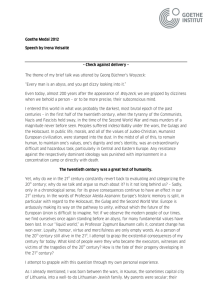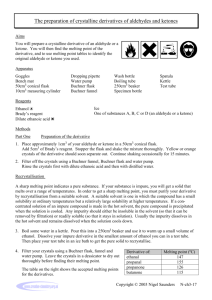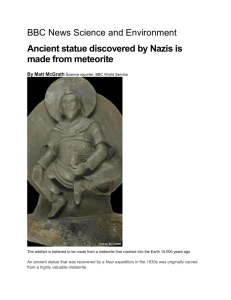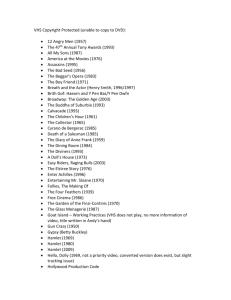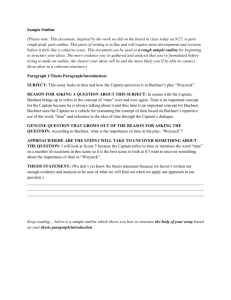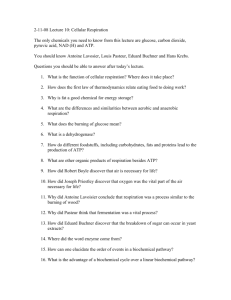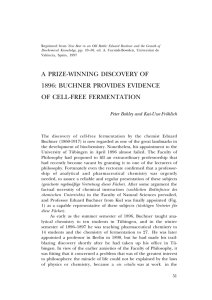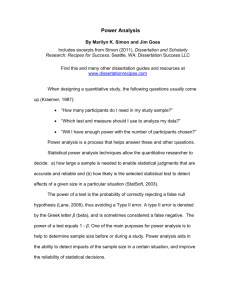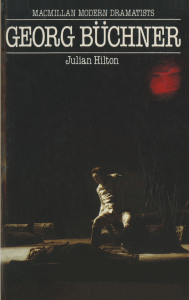Woyzcek 07 - Larry Gleason
advertisement
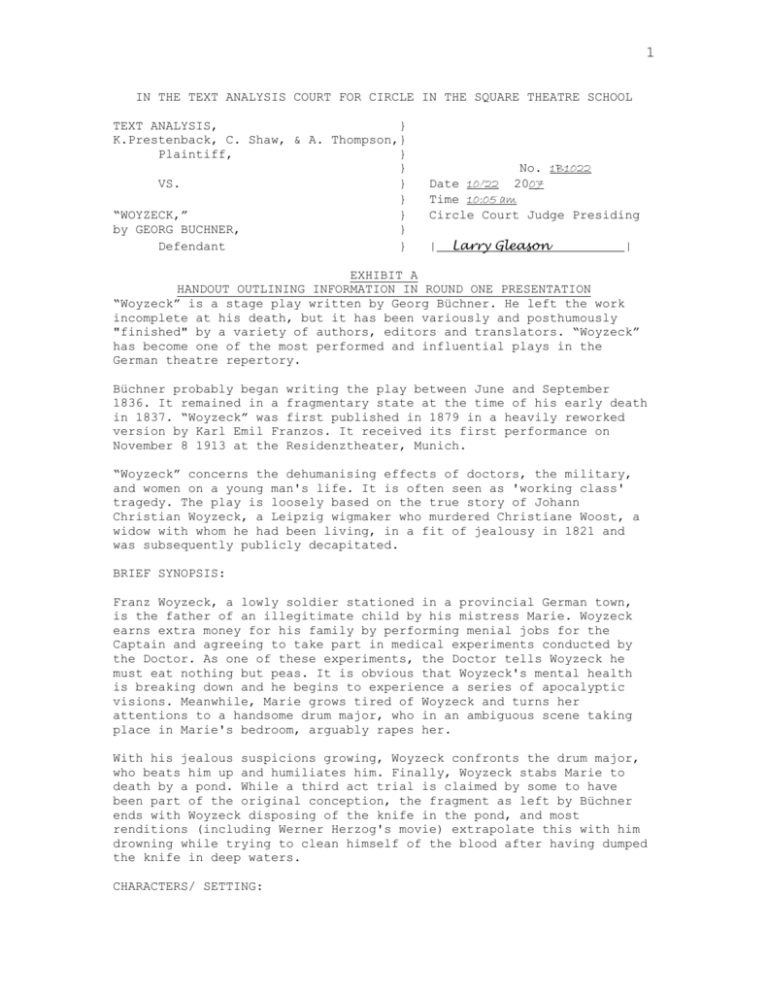
1 IN THE TEXT ANALYSIS COURT FOR CIRCLE IN THE SQUARE THEATRE SCHOOL TEXT ANALYSIS, } K.Prestenback, C. Shaw, & A. Thompson,} Plaintiff, } } VS. } } “WOYZECK,” } by GEORG BUCHNER, } Defendant } No. 1B1022 Date 10/22 2007 Time 10:05 am Circle Court Judge Presiding | Larry Gleason | EXHIBIT A HANDOUT OUTLINING INFORMATION IN ROUND ONE PRESENTATION “Woyzeck” is a stage play written by Georg Büchner. He left the work incomplete at his death, but it has been variously and posthumously "finished" by a variety of authors, editors and translators. “Woyzeck” has become one of the most performed and influential plays in the German theatre repertory. Büchner probably began writing the play between June and September 1836. It remained in a fragmentary state at the time of his early death in 1837. “Woyzeck” was first published in 1879 in a heavily reworked version by Karl Emil Franzos. It received its first performance on November 8 1913 at the Residenztheater, Munich. “Woyzeck” concerns the dehumanising effects of doctors, the military, and women on a young man's life. It is often seen as 'working class' tragedy. The play is loosely based on the true story of Johann Christian Woyzeck, a Leipzig wigmaker who murdered Christiane Woost, a widow with whom he had been living, in a fit of jealousy in 1821 and was subsequently publicly decapitated. BRIEF SYNOPSIS: Franz Woyzeck, a lowly soldier stationed in a provincial German town, is the father of an illegitimate child by his mistress Marie. Woyzeck earns extra money for his family by performing menial jobs for the Captain and agreeing to take part in medical experiments conducted by the Doctor. As one of these experiments, the Doctor tells Woyzeck he must eat nothing but peas. It is obvious that Woyzeck's mental health is breaking down and he begins to experience a series of apocalyptic visions. Meanwhile, Marie grows tired of Woyzeck and turns her attentions to a handsome drum major, who in an ambiguous scene taking place in Marie's bedroom, arguably rapes her. With his jealous suspicions growing, Woyzeck confronts the drum major, who beats him up and humiliates him. Finally, Woyzeck stabs Marie to death by a pond. While a third act trial is claimed by some to have been part of the original conception, the fragment as left by Büchner ends with Woyzeck disposing of the knife in the pond, and most renditions (including Werner Herzog's movie) extrapolate this with him drowning while trying to clean himself of the blood after having dumped the knife in deep waters. CHARACTERS/ SETTING: 2 “Woyzeck” takes place in a variety of locations throughout a small provincial German town where troops are garrisoned in the early 19th century. Woyzeck: Listed as "a military barber," Woyzeck is the play's title character and protagonist. He is of low economic status. He is an archetype of human suffering. Marie: Woyzeck's common-law wife, with whom he has a nearly two-yearold illegitimate child. Andres: A fellow soldier, friend and confidant to Woyzeck. He is a foil for Woyzeck, being of the same economic status and rank in the military, but mentally sound. Child: The illegitimate child of Marie and Woyzeck, who is nearly two years old. Margreth: Marie's neighbor. Drum-Major: The stalwart and cocky leader of the military drum corps. He is of the middle class and ranks above Woyzeck. Sergeant: A military officer and friend of the Drum-Major's who is with the latter when he first spots Marie at the fair and helps him snare her. Old Man: A poor, old man who sings outside the fair. His presence introduces the hopelessness of lower-class. Showman: The emcee at the fair booth, who conducts a show with a dancing monkey and "astronomical horse" that can supposedly tell time. Officer: The military official to whom Woyzeck reports, and whom he shaves daily. Woyzeck calls him "my Captain." The Officer makes a habit of mocking Woyzeck pretentiously, saying that he lacks morals and virtue. The Officer represents the middle class, who are lazy and pompous in their security. Doctor: A physician and university researcher, who is using Woyzeck as the guinea pig for his unethical experiment. Professor: A professor collaborating with the Doctor. 1st and 2nd Journeyman: Two workers who are dancing and drinking at the inn Idiot: Also known as Karl. He helps Marie take care of her child, and can often be found mumbling to himself aimlessly. Jew: The owner of the shop Woyzeck visits. He sells Woyzeck the knife with which he fatally stabs Marie for two groschen. Grandmother: Either Marie's mother and her child's grandmother, or an old woman of the neighborhood. She tells Marie and the children a 'black fairy tale' or 'anti-fairy tale' about a poor orphan who is sad and lonely for all eternity with absolutely no hope for bettering his situation. Although she appears only once and briefly, her story 3 encapsulates Buchner's tragic, fatalistic point of view about man's existence and the fate of the lower class. Innkeeper: Owner of the inn where Woyzeck and others go to drink and dance. Kathe: A woman who is dancing at the inn. Policeman: The last speaker in the play, who describes the murder as "lovely" to those present in the last scene. Others: Minor characters who appear at different points in the play. Described by Buchner as: "soldiers, sundry men and women, students, children, court officials, judge." MAJOR THEMES: “Woyzeck” is a comment on social conditions as well as an exploration of complex themes such as poverty. The playwright does make clear that Woyzeck is not naturally insane but rather driven to the brink by society's treatment of him. Still, he allows insanity to be the foremost trait we experience in Woyzeck. In “Woyzeck,” sexuality is illicit and connected with madness and violence BIOGRAPHY OF GEORG BUCHNER (1813-1837): Georg Buchner (pronounced Buechner) was born on October 17, 1813 in the small town of Goddelau, in Hessen, Germany. His father, a scientist and rationalist, primed him from an early age with a scientific approach to the world, which would later manifest itself in the sharp, realistic, and critical nature of his writing. Buchner grew up in a stable, pleasant household, though he eventually became unusually disillusioned and pessimistic in his literary style. He began his medical training at Strasbourg in 1831, where he became clandestinely engaged to Minna Jaegle, the daughter of a pastor. Two years later he transferred to Giessen, where he began to study philosophy and history. It was there that he became embroiled in his country's political arena, helping plot a conspiracy against the Hessian government. In an attempt to mobilize the peasantry, he published a famous revolutionary political tract, “The Hessian Messenger.” Because of his radical political involvement, Buchner was eventually forced to flee Germany altogether. After settling there, he relinquished his political fervor and developed a politicallydisillusioned outlook that manifested itself deeply in his three plays, “Danton's Death,” “Leonce and Lena,” and especially his ultimate effort, “Woyzeck.” In addition to these, Buchner completed the introspective story, “Lenz,” and a play based on the life of the Venetian wit Pietro Arentino. Despite the short length of his literary career, Buchner contributed immeasurably to the dramatic canon and being considered "the inexhaustible source of modern drama," he never considered himself a playwright by profession. While in Zurich, he was preparing to be a researcher and teacher at the university. As a writer, Buchner's influences included Shakespeare first and foremost, in addition to the young Goethe and writer Johann 4 Michael Reinhold Lenz. Buchner did not identify himself with any of the literary movements of his time, save perhaps the Storm-and-Stress movement of the 1770s, but it is certain that he had no patience for Romanticism or any other trend that drew focus away from or made fantastical the raw nature of life. Although scholars have interpreted his works in the various contexts of their own interest and times, there is a common agreement that Buchner's work is so ahead of its time that it will always remain universal. He is said to have precipitated a wide and far-reaching array of literary movements including: "Naturalism, Social Realism, Psychological Irrationalism, Expressionism, and Existential Theatre." As Herbert Lindenberger phrases it, he is "perhaps the only German writer before our own [20th] century who speaks directly to our time without the need of mediation." Georg Buchner died of an undiagnosed fever, probably typhus, at the age of 23 on February 19, 1837. COMPLETE DRAMATIC WORKS: “Danton's Death” -- 1835, first performed 1902 “Leonce and Lena” -- 1835 “Woyzeck” -- began work in 1836, left incomplete in 1837, published in 1878 HISTORICAL BACKDROP: 1804 1812 1813 1814 1815 1819 1825 1828 1830 1831 1833 1834 1835 1836 1837 1878 1902 1910 1913 Friedrich Schiller writes his last play, William Tell. Napoleon reaches Moscow but is forced to retreat, losing almost 600,000 men in battle. Georg Buchner is born in Hessen, Germany. Prussia invades France after Napoleon's defeat at Leipzig. Two million lives are lost in the wars. The German Confederation is established. August Friedrich von Kotzebue, one of the most popular playwrights of the time, dies. Buchner enters the Grand-Ducal Gymnasium as a student. Russia declares war on Turkey. France invades Algeria. Buchner enrolls at the University in Strasbourg to study medicine. He falls in love with Minna Jaegle and they become secretly engaged. Johann Wolfgang von Goethe writes the second part of Faust. Belgium gains independence from the Netherlands. Buchner transfers to the University of Giessen Slavery is abolished in Britain. Buchner writes the radical political pamphlet “The Hessian Messenger.” He moves back to Strasbourg to escape arrest. Buchner completes his first play, “Danton's Death.” He writes his second play, “Leonce and Lena,” for a competition. Buchner receives his doctorate. He begins working on “Woyzeck.” February: Buchner contracts typhus and dies the age of twentythree. The first version of “Woyzeck” is published by Karl Emil Franzos under the title “Wozzeck.” The first performance of “Danton’s Death.” A revised version of “Woyzeck” is produced by Max Reinhardt. Premiere of “Wozzeck” in Munich.
